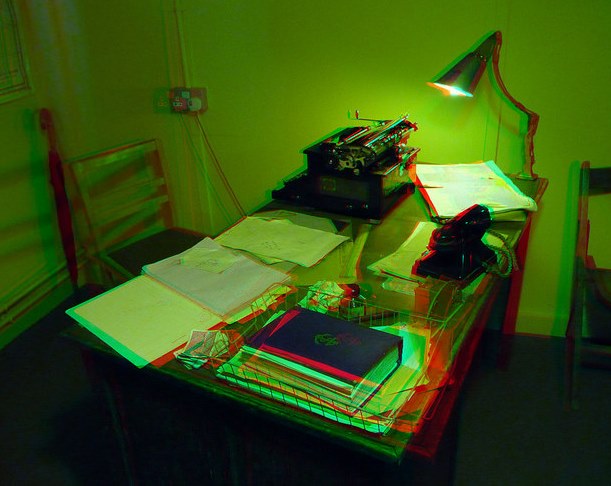Here’s a snippet of Linda Bierd’s poem “Evolution”, which is about Alan Turing:
“He was halfway between the War’s last enigmas
and the cyanide apple — two bites —
that would kill him. Halfway along the taut wires
that hummed between crime
and pardon, indecency and privacy. How do solutions,
chemical, personal, stable, unstable,
harden into shapes? And how do shapes break?”
Alan Turing’s story is pretty well-known, so I won’t rehash it in detail. He was the father of modern computer science, by all accounts a brilliant and extraordinary man. Tragically, Turing was broken by the state that he helped save from Hitler’s ambition. He committed suicide a couple of weeks before his forty-second birthday.

Turing’s desk. Image via techboy_t.
What do we owe to our heroes? The ones who don’t die prematurely often end up disappointing us. For example, many people were introduced to the practice of rationality by Richard Dawkins, who seems to have lost his shit. (He thinks that Ahmed Mohamed, the Muslim kid who brought a clock to school and was accused of having a bomb, is some kind of scam artist. Don’t focus on whether that’s plausible — Dawkins’ obsession is bizarre regardless.)
Rachel Nabors, an animation expert and all-around wise lady, cautioned community-builders:
“Even the people we respect the most are flawed and can perpetuate flawed thinking, from data to ethics. When I reflected on my own life choices, what I want to be and do in the web community, I realized that I was setting myself up to be a gatekeeper, a person others go through to get to something, and that I, too, am flawed.”
We live in a world of dictators and persecution. And yet there are leaders like Nabors, who are careful not to exploit their power, even among peers in a niche professional subculture (web animators). One reality contains many sub-realities, and we must wander between them.


Comments are closed.